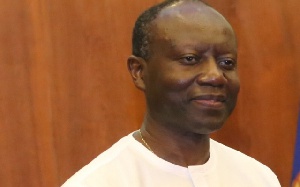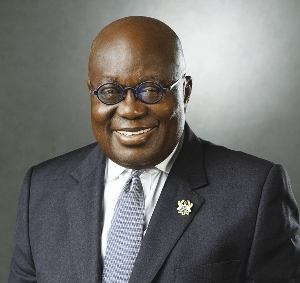Politics of Thursday, 8 June 2017
Source: dailyguideafrica.com
Minister blasts NDC over $2.25bn bond
Finance Minister Ken Ofori-Atta yesterday defused the controversy surrounding the issuance of the $2.25 billion bond.
He indicated in parliament that the domestic bonds were issued in a competitive and transparent bidding process managed by Joint Book Runners namely, Barclays, Stanbic and Strategic African Securities (SAS).
The book runners, he maintained, were engaged by the previous government for similar bond issues and that there was no secrecy in the process, insisting that it was transparent.
The Finance Minister was in parliament to brief the house on the issuance of the bond upon the request of the minority National Democratic Congress (NDC) through the invocation of Half-Hour Motion by the minority leader, Haruna Iddrisu on Wednesday, May 31.
The minority claimed that there was a conflict of interest situation in the issuance of the bond since one Trevor G. Trefgarne, who represented Franklyn Templeton – the company that bought the chunk of the bond issued in April – was a director of Enterprise Insurance which the minority claimed the minister had interest in.
Enterprise Insurance had Ken Ofori-Atta as a director.
But in his response on the floor, the minister said there were no breaches in integrity during the transaction, insisting that any such allegation of integrity deficit is borne out of lack of understanding of the transaction.
“It may be tempting to say that the apparent attempt to manufacture some form of integrity deficit is generally borne out of a lack of understanding of the actual process on the part of the manufacturers. But, that may be deemed too charitable, considering the CVs of some of the personalities involved.
“We in the ministry have nothing to hide. We know the cynicism at the ministry but we have been placed in this position by the president because of our experience, our network and competence,” Mr Ofori-Atta underscored. He stressed that the economic management team of this government would continue to do its best to convince the world to have faith in the economy since the team has a considerable network of decision-makers globally and sufficient credibility within the investor community.
The minister said the bond was denominated and issued in Ghana cedis and not a dollar bond, adding that the advantage of opening it up to foreign investors was that they bring in their hard currency to purchase the bond in the local currency.
Mr Ofori-Atta asserted, “This has the positive impact of helping to strengthen the cedi,” emphasising that high participation of foreign investors who brought in considerable foreign exchange through their custodian banks had created the impression to some people that it was a dollar bond.
He said the bad mouth and empty allegations surrounding the bond issue by the NDC could rather have an adverse impact on investor confidence in the economy.
According to him, the Akufo-Addo government inherited from the Mahama administration an economic paradigm of “borrow more and tax more” which worsened Ghana’s precarious economy.
The finance minister said the new government had to think outside the box and execute a new debt management strategy that would cure the mess.
The new strategy, Mr Ken Ofori-Atta noted, was to re-profile the country’s debt by issuing bonds that would not increase the country’s debt burden.
He was surprised at the attempts by the minority to scandalise the strategy, using the $2.25 billion bond issue as fodder.
The minister explained to the MPs that the transaction was debt neutral because it did not add a pesewa to the country’s debt stock.
According to him, the transaction eliminated the costs associated with cross-continental road shows, saved the nation about GH¢600 million in interest payments and reduced refinancing costs associated with short-term borrowing.
Benefits
Mr Ofori-Atta further explained that the $2.25 billion, equivalent to GH¢9.7 billion, had improved the country’s gross international reserves and even stabilized the cedi and also reduced interest rates.
He told parliament that the bond participants are no strangers to the country’s bond market, and as a matter of record, have been investing in the local banks for the last decade.
He said Franklin Templeton Investments is not a person as the minority will want Ghanaians to believe, but it is an entity which owns the Templeton Global Bond Fund; and is one of the world’s largest assets management groups with over $850 billion in assets under management on behalf of over 25 million private, professional and institutional investors.
He indicated that in all his professional life, he had never had the opportunity to meet the founder – Rupert Harris Johnson Snr – who retired in 1956 and died in March, 1989 at age 89.
According to the minister, it is the normal practice since the book building process began in 2015 that the joint book runners announce the sale of the bonds as per the second quarter of the issuance calendar and after that, primary dealers who are mostly banks, would mobilise interested foreign and local investors to participate in the sale.
“Mr speaker, all over the world, government securities are issued in a manner that is quite distinct from other forms of borrowing and there are elaborate rules that govern the issue of the bonds,” he said, adding that the ministry of finance did not deviate from those rules in issuing the 7-year and the 15-year bonds and re-opening the five-year and the 10-year ones for tap-in, with the view to building benchmark bonds and improving liquidity in those instruments.
Mr Ofori-Atta pointed out that bonds are part of government securities and constitute direct, unsecured and unconditional obligations of the Government of Ghana to finance government budget deficit as approved by parliament, and to build up and maintain a liquidity buffer at a level or range to be determined by the minister of finance.
He indicated that in response to the inordinate budget deficit and the government’s refinancing strategy, the ministry published government’s issuance calendar for the first quarter from January to March and the first issuance calendar was prepared to meet the provisions of the implementation of Article 180 of the 1992 Constitution to meet the Expenditure in Advance Appropriation.
He said the Bank of Ghana also published the notice to primary dealers, banks, stock brokers and the general public.
Buy Back
He said second quarter issuance calendar by the ministry was on March 30, 2017 for April to June and per the second quarter issuance calendar, the five-year and the 10-year bonds in April, 2017 were to be raised by re-opening the existing 5-year bond at 18.75% coupon rate and 10-year bond at 19.0% coupon rate, that are due to mature in January, 2022 and November, 2026 respectively.
“Mr Speaker, this was the first time in Ghana that a callable option had been applied to a bond; and the intention is to provide the opportunity for the government to buy it back in five years, if interest rates become more favourable,” he articulated.
Mr Ofori-Atta maintained that up to date about GH¢2.5 billion out of the total amount raised from the bond had been used to re-profile the country’s debt while GH¢1.1 billion had been used to finance the budget, stressing that the ministry would continue to use the remaining amount to re-profile short-term maturing bills.
After the minister had briefed parliament on the so-called controversial bond, he presented all relevant documents associated with the transaction to parliament for its perusal; but the minority, led by the ranking member of finance, Cassiel Ato Forson, said the minister failed to present all documentations covering the transaction.
He also indicated that there were discrepancies in the figures presented by the minister per the issuance calendar, and that the figures churned out did not add up so they would continue to use every available means to pursue the matter further.











